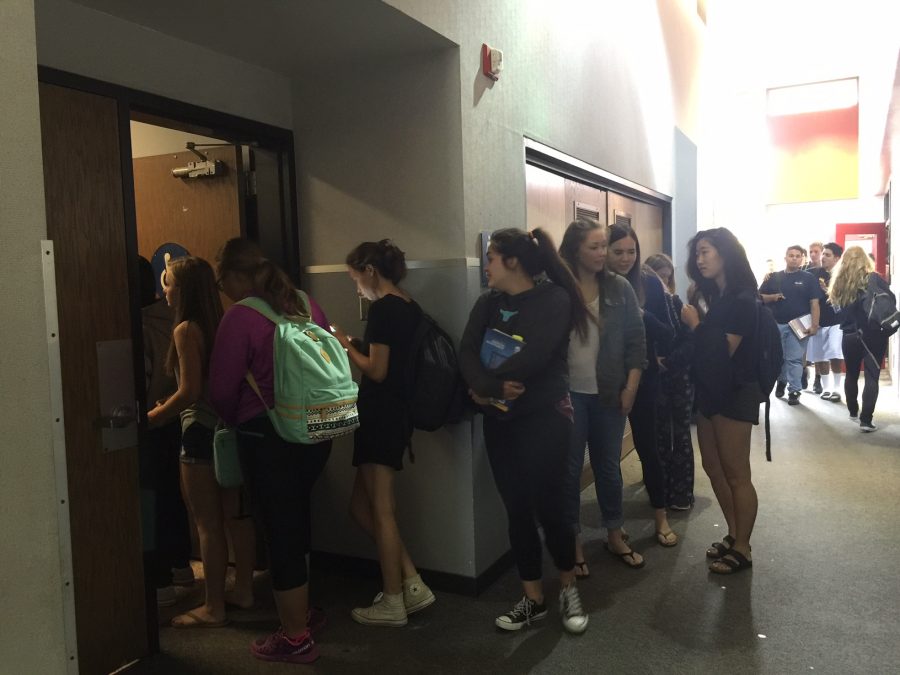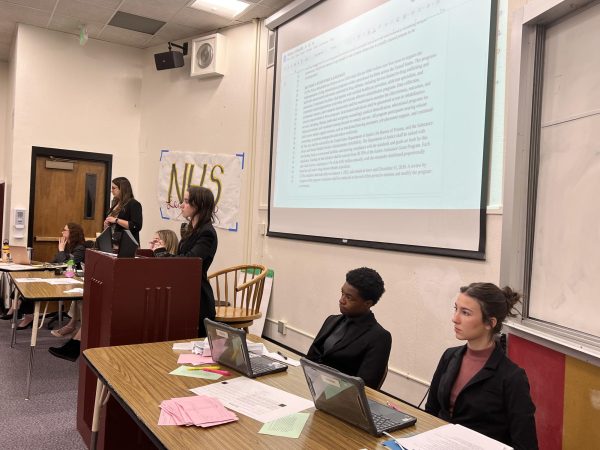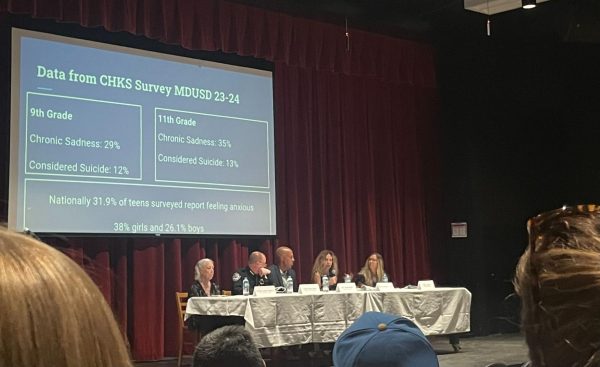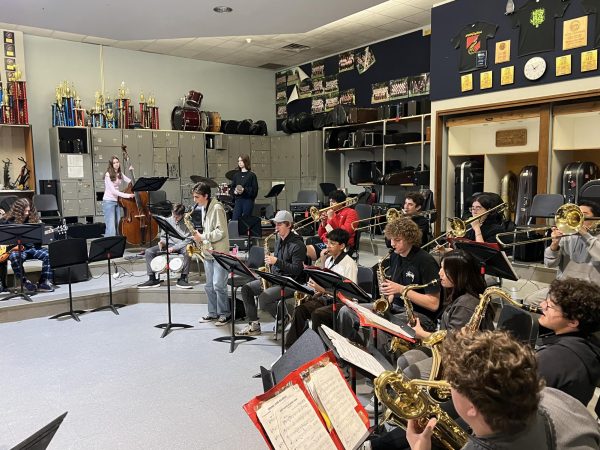Students face strict new tardy policy
Girls wait in line to use the bathroom during brunch in early September. Some students say the tardy policy is impacting their use of the restrooms.
Don’t be late. That’s the message Northgate is sending to students in its new strengthened tardy policy.
According to the new plan, five tardies in a quarter results in a one-hour detention after school; 10 tardies is a Saturday school and a parent contact; 15 tardies is a Saturday school and a parent contact with a behavior contract; 20 tardies is an activity suspension; and 25 tardies will lead to possible suspension and require a principal’s conference.
The new policy, announced by administrators during the first week of school, has led to some controversy and discussion among students on whether it is too strict. Students and administration both admit that it is quite the change from last year’s laid back policy, where five tardies a week resulted in a detention and the total count restarted each week.
Some students say that to allow only five total tardies in a quarter–which is about nine weeks long with about 270 classes based on a six-period day–is unreasonable. Last year’s policy started the tardy count over each week, after about 30 classes.
“I think the new tardy policy is very unnecessary and that the admin is just trying to ruin the school,” senior Albert Miraflores said.
That is hardly the goal, according to administrators. The new policy has been in the works since last year and, with input from teachers and vice principals, was implemented to better the learning environment by getting students to show up to class on time, Principal Michael McAlister said.
“Yes, it is tough,” McAlister said in an interview the first week of September, ”but the follow up question to that is, ‘can you operate under these conditions?’ The answer is yes.”
Some cite a reasonable excuse for a tardy such as crowded hallways that are hard to manage.
“I understand they placed the policy to motivate students not to be late, however it may be a little too strict,” junior Malvika Doppalapudi said. “Many administrators argue that five minutes between a passing period is enough time, but I don’t think they’ve ever tried walking through the halls during a passing period to get to the other side of the school. Maybe instead of five tardies getting you a detention, they should make it 10 (before a detention) as a compromise.”
However, not all students see a problem with the change. Senior Mark Kassiceh also gave his opinion on the new policy. “While I think it’s pretty strict and doesn’t give a lot of leeway, I think it’s the right way to stop the issue with tardies that have been going on,” he said.
Some students are critical about such a strict policy and question whether the rule is equally applied to all on campus. “What about the teachers being tardy?” junior Aisling Murphy asked rhetorically while discussing the issue.
McAlister said students, not teachers, are his primary concern. “You know, I don’t see it often,” he said. “I’m sure it happens. We are all human. What I’m concerned about, even with the kids, everyone is late once in awhile. I’m late sometimes, but what I’m concerned about is the habitual tardiness.”
Although some students may not be concerned with the new tardy policy because they are rarely late, this policy will cause some harm to those who run late from the bathroom or from simply being held by a teacher who happens to be across campus from your next class.
Freshman Julia Allen is new to Northgate but has concerns about the policy. “I believe this new policy is ridiculous,” Allen said. “Sometimes the lines in the bathrooms are too long and my teachers won’t let me go without using my extra-credit bathroom passes. I shouldn’t be expected to wait two hours to use the bathroom.”
As stated in the handbook, 20 tardies in a quarter result in activity suspension, which restrains a student from attending activities such as homecoming, Junior Prom or Senior Ball. Some students say that this is quite unfair because they have worked hard to achieve these activities and shouldn’t get them taken away for being a little late to a class.
However, the administration doesn’t believe that students who achieve those 20 tardies deserve to attend these activities. When asked about the effect on these social events, McAlister reaffirmed the policy. “I believe anyone who gets 20 tardies is working to get there,” he said. “So they must not want to be able to go. My sense is that it will have next to no effect.”
Even with the controversy, the students and administration agree that students come to school to get an education, and that requires showing up on time.
Honors and AP chemistry teacher Kevin Taylor believes that this is a good plan to get students to class on time. He says most of his students aren’t late due to pop quiz consequences for tardies, but he has noticed the halls being more empty after the bell rings, especially during his fifth period prep when he is out in the halls. “I like that the new tardy policy now covers all day classes and holds the students more accountable,” Taylor said.
Math and engineering teacher Mark Tobin says that his students typically aren’t late because punctuality counts for participation credit. He added that school is like “real life,” and that punctuality counts. “In here, school is all about developing habits for life,” he said.
School officials are confident that this is the right plan for Northgate, and one that appropriately holds students accountable.
“Tardies is an area where students do have control over in their lives,” McAlister said. He added that “expectations are clear and when expectations are clear, usually there is a tremendous amount of cooperation both from the administration, teachers and the kids.”










